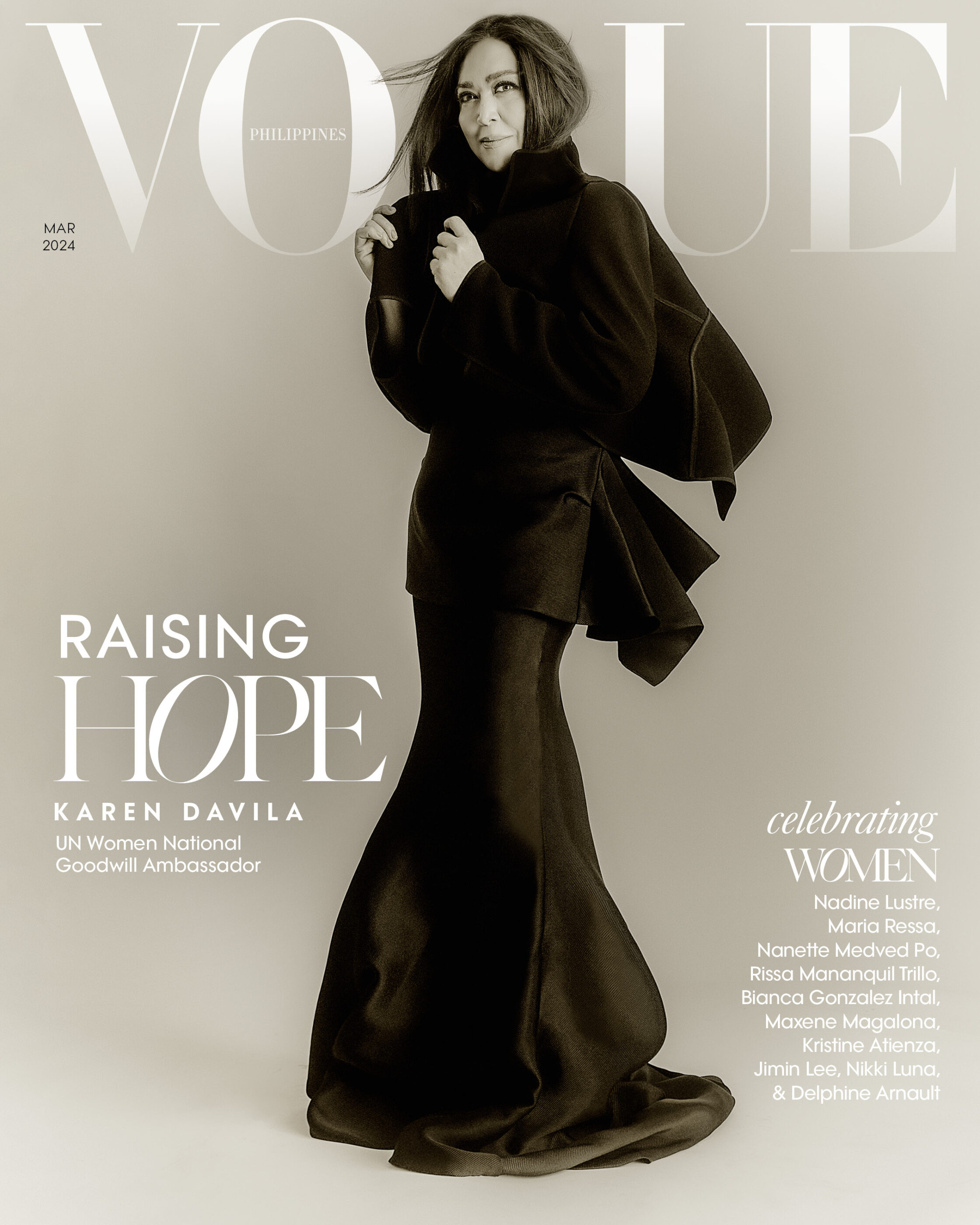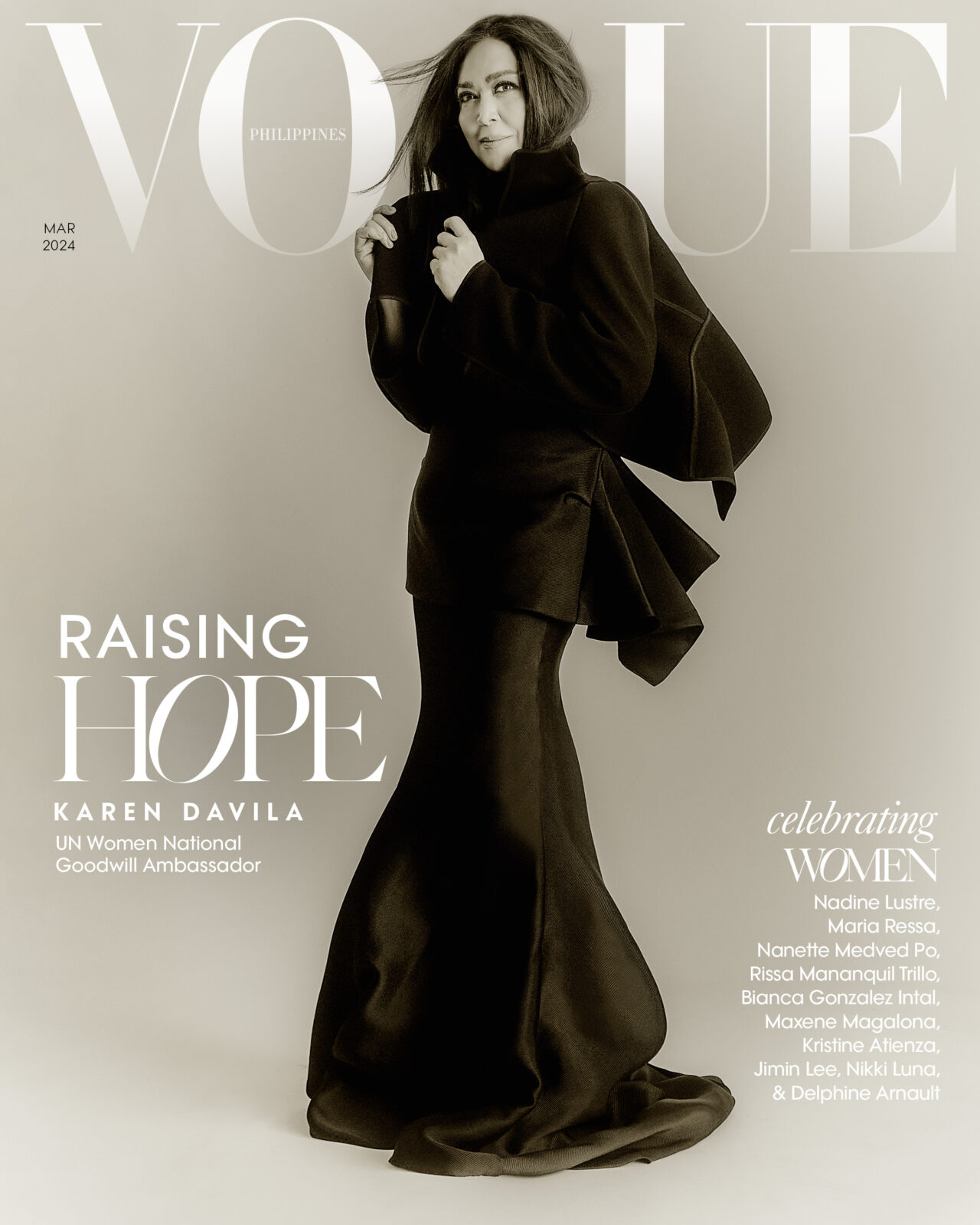Karen Davila fronts Vogue Philippines’ March 2024 issue, themed “Raising Hope” in the spirit of International Women’s Month. Visit vogue.ph everyday this month for daily features on inspiring women, as nominated by the people whose lives they’ve changed.
If high school pipe dreams went the way as planned, Karen Davila would’ve been a fashion designer. Middling at best, because she herself admits she wasn’t very good. Her father put things more bluntly, she recalled. That people who aren’t talented end up in the poorhouse.
Her creative flair is evident in her tastefully decorated home, her furniture a neutral palette, a foil for the works of art that adorn her walls. Behind where we sit, abstracts by Bernardo Pacquing, adjacent to a comforter cast in resin by Nikki Luna, evoking gender struggle. Across the room, on its own, a Fernando Zobel.
On the coffee table in front of us, books on fashion photographs that have appeared on the pages of Vogue through the years.
Karen still remembers the first time she held a copy of the magazine in her hands. It was sent by a former neighbor who had moved to the U.S.
“It was 1986, a closeup of Cindy Crawford in pink, a closeup with her mole,” Karen says. “That’s the first time I discovered Vogue. I read about Donna Karan and the body suit she designed, and I decided, ‘this is who I want to be. I can draw, I can design. I want to be a fashion designer.’”
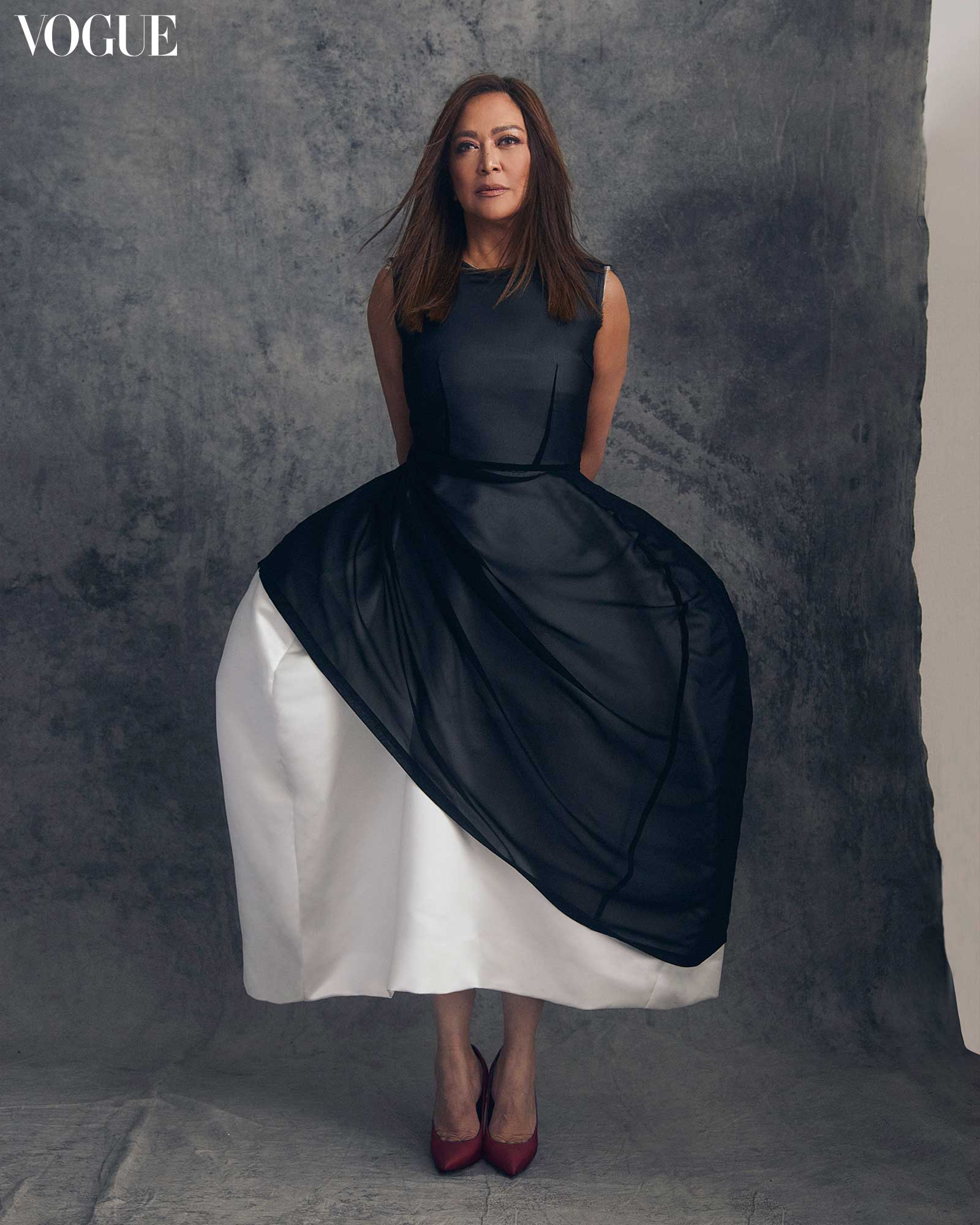
Karen, ambitious even as a young girl, applied for a full scholarship to Parsons School of Design in New York.
“I got completely rejected,” she says. “I thought my life was over.”
Karen, in real life, is the same as Karen onscreen. She’s vivacious, outspoken. She directs the conversation the way she does when she’s doing interviews, only this time, she isn’t. She moves in close, touching your shoulder, your arm, breaking down invisible walls, which, for some may come across as intrusive, an encroachment on personal space; or it may create intimacy, a shared space with this natural, ebullient woman who radiates warmth.
Ever the storyteller, Karen draws you in with her anecdotes, told in the familiar husky voice known to millions across the country.
She continues narrating the story of her life.
She’d been part of the high school paper at Colegio San Agustin, so she decided to take Mass Communications at the University of the Philippines, she says. At the time she thought she would be a print journalist, till one day, Evelyn David, her professor, told her she enunciated her words well, and that perhaps she should be on TV.
Karen took that advice to heart and entered the dog-eat-dog—or perhaps more apt, cat-eat-cat—world of broadcasting in 1993.
“Back then, the industry fostered competition between women, which was both good and bad. Good, because it pushed you to do your best, but bad, because we always felt threatened by each other. That was the culture back then. It was a fiercely competitive environment,” says Karen. “Women anchors were pitted against each other for shows. We were trained with a mindset of lack. That queen bee syndrome, that there could be only one, that mindset should die. There is nothing like that with men.”
“I knew I wasn’t extremely beautiful the way other newscasters are, but I worked hard. I learned everything about the industry at GMA 7. I wrote, researched, transcribed, sat in the editing room, did the broadcasts. There were no shortcuts,” Karen says.
“When you’re on the ground it develops awareness, not just with the eyes, but with the head and heart.“
In the close to seven years she was with GMA, she worked on an investigative news show, Brigada Siete with Louie Beltran, anchored Saksi, a Tagalog newscast, and then worked with Cheche Lazaro’s Probe Team.
In the year 2000, Karen moved to ABS-CBN, where she honed her craft to the fullest.
Today, 24 years later, many begin their day watching Karen interviewing relevant newsmakers of the day on ANC’s Headstart. In the evenings, Filipinos from all strata of society tune in to “TV Patrol,” ABS-CBN’s primetime news program. For many years, a late-night audience watched Karen on the news show Bandila, till it was rudely interrupted by the COVID-19 quarantine, then later canceled after the network lost its legislative franchise.
In between Karen’s morning and evening shows, she goes out on the field searching for success stories of everyday Filipino entrepreneurs for her weekly show My Puhunan. She’s also ventured into lifestyle interviews and entered the world of social media, with her YouTube channel that currently has 1.8 million followers.
Today Karen Davila is a household name, her face recognizable to millions of Filipinos. She’s been on practically every who’s who list that counts: Ten Outstanding Young Men (TOYM), The Outstanding Women in the Nation’s Service (TOWNS), The Forum of Young Global Leaders at the World Economic Forum.
In 2006, she won the UNICEF Child Rights Award for a documentary on children in jail.
“I went to our local city jails and saw minors in the same cells as adult offenders. Imagine, 10-and 12-year-olds in the same cell as 25- and 40-year-olds. It was so tragic,” says Karen. “That was the kind of exposure I had all those years. When you’re on the ground it develops awareness, not just with the eyes, but with the head and heart.”
Over the years, Karen supported many advocacies such as World Vision, dedicated to bringing children out of poverty through education, and Habitat for Humanity, that builds homes for those who have none.
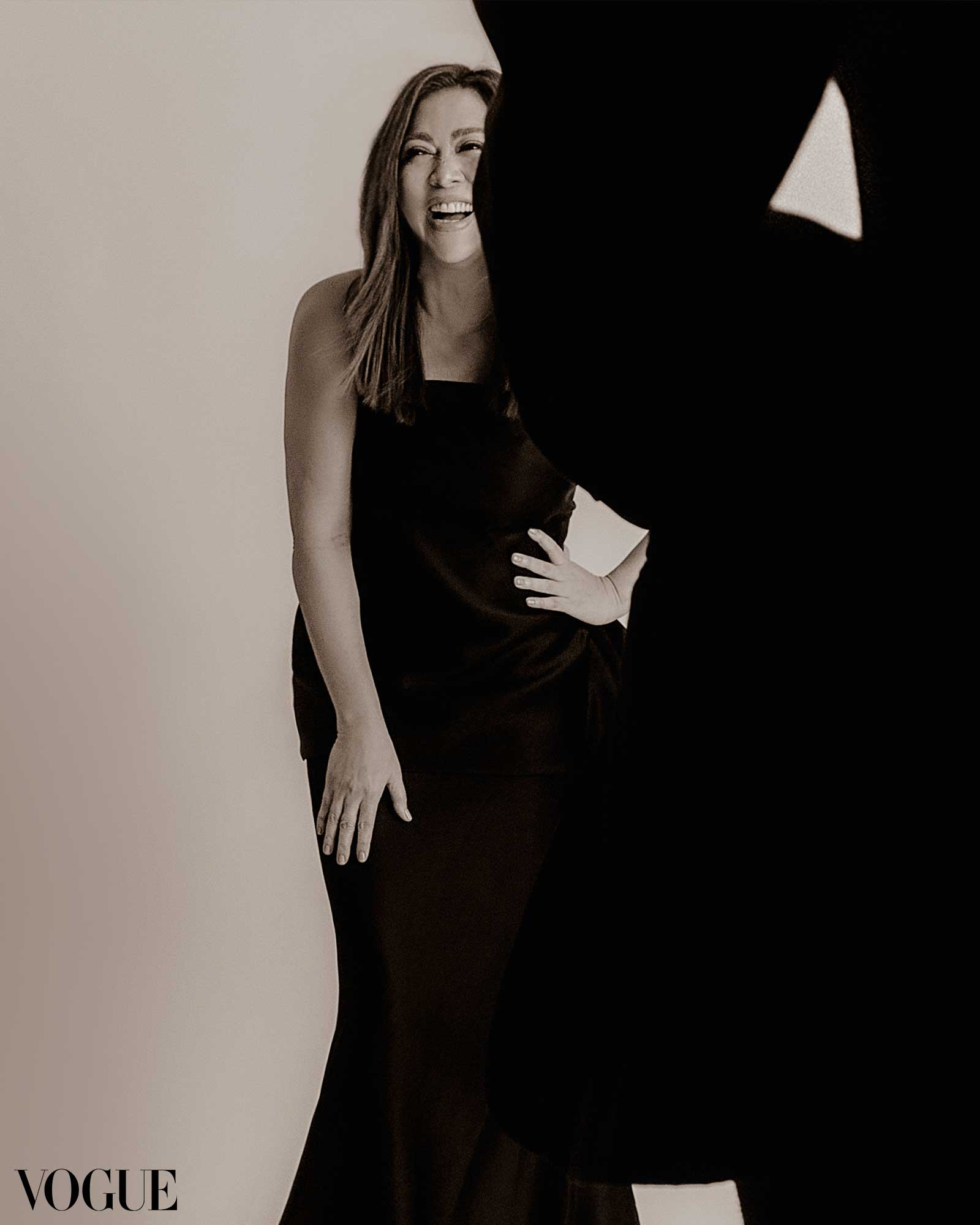
“I put my passion into the importance of building homes for the poor to give them dignity,” says Karen. “A mother and father feel more empowered in raising their children when they have a home of their own.”
During the COVID-19 pandemic, Karen turned 50, and decided she wanted to involve herself with women’s causes. She reached out to Lenlen Mesina, UN Women’s country coordinator in the Philippines, and asked how she could help. When Typhoon Ulysses hit the nation, Karen helped put up the Agapay Nanay initiative, helping to ensure support for nearly 5,000 women.
“Agapay Nanay gave gender-sensitive assistance to women. During a calamity, a man is usually able to fend for himself immediately. But a woman is likely the one left taking care of the children, the last to leave the home. They’re usually left in dire situations.”
“The face of poverty is a she. Women are poorer than men, anywhere you go,” says Karen.
Late last year, Karen was named the first United Nations Women Philippines goodwill ambassador, joining a dozen other fellow ambassadors including Nicole Kidman and Emma Watson who champion women all over the world.
“It was such an amazing surprise, a humbling recognition and validation,” says Karen. “The Philippines had never had one before. It’s such an honor to push the agenda for Filipino women, to pave the way for other advocates in the future.”
In January, UN Women Philippines launched the SHEstems scholarship program, awarding stipends of P120,000 each to a dozen young female students who want to pursue a career in Science, Technology, Engineering, and Mathematics (STEM). Currently, she says, only three out of 10 Filipino STEM professionals are women.
Karen says that as a whole, the Philippines doesn’t do too badly in terms of gender equality standards worldwide. Last year, we ranked 16th in the Global Gender Gap Index. After all, we’ve had two female Philippine presidents, and have female representation in both houses of Congress, although she points out there are only seven women out of 24 senators and less than 80 women out of the more than 300 members of Congress.
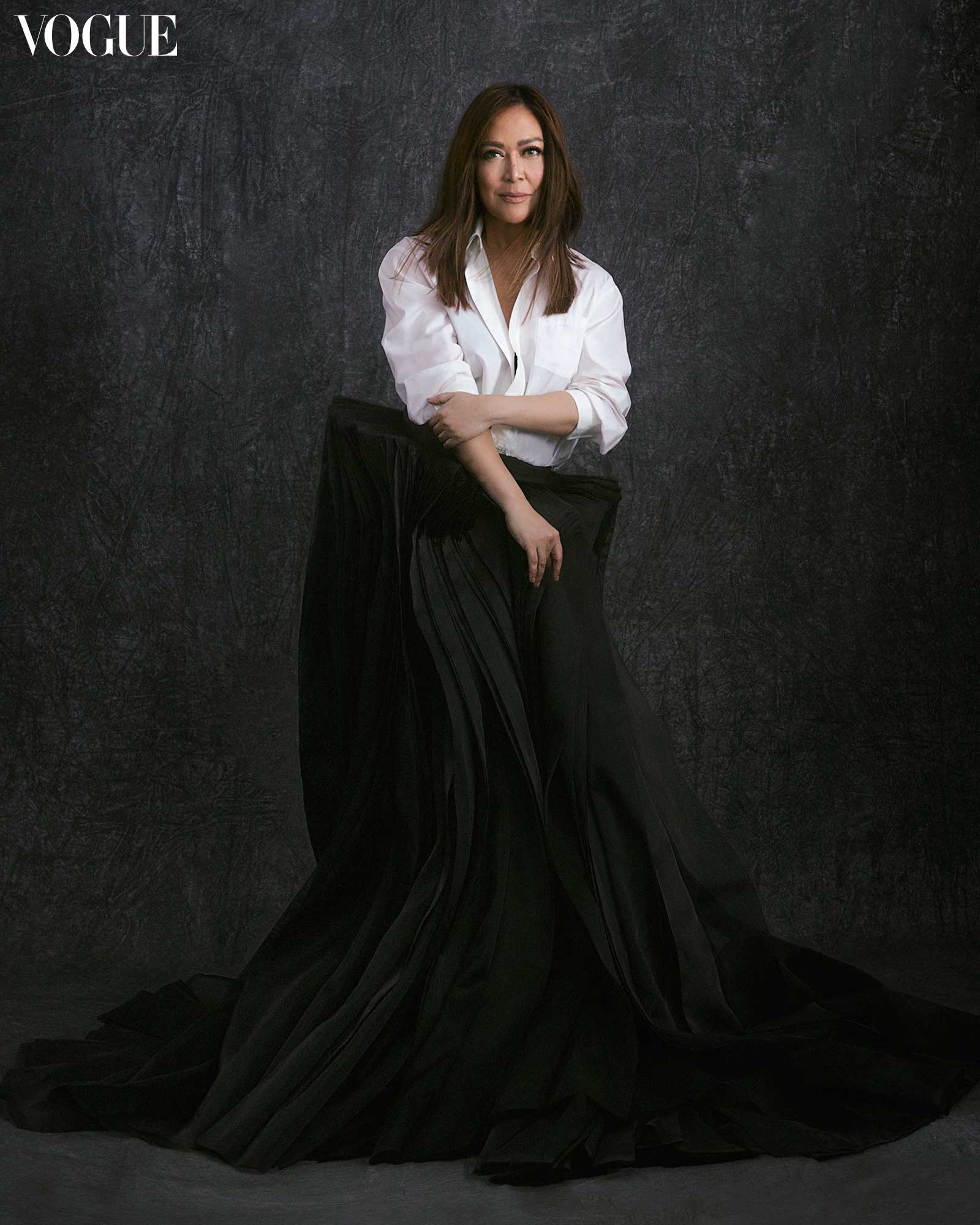
“We have to normalize that women have just as much right to be in a boardroom, or writing legislation. We have to normalize that women are just as good, or even better than men,” Karen says.
“At work, I remember many years ago, I had bosses who said, “you know what, Karen? You’re too ambitious,’” she says. “When a man is called ambitious, that’s a good thing, right? So why is it negative for a woman to be considered ambitious? Why is it when a man is driven, he’s applauded. When a woman is driven, she’s accused of being vicious, scheming, calculating.”
“I’ve been called ‘aggressive,’ but am I not, perhaps, just ‘assertive’?” she asks.
We ask what her husband, DJ Sta. Ana, a former news director turned corporate affairs executive, thinks of her unrelenting drive in her career.
“My husband is the silent type but he’s strong. It takes a strong man to be secure with a woman who’s chasing her dreams,” she says.
Karen credits her 90-year-old mother as the other strong presence in her life who enabled her ambition.
“My mother is the biggest influence in my life. My work ethic came from her, she always worked extremely hard,” she says. “When Ninoy Aquino died in 1983, I was 12 years old. I remember first feeling the effect on the economy when people in our village started selling their homes and moving to the province.”
Karen recalls how her mother started small businesses to pay for their tuition.
“I remember when my mom opened a small eatery in Manila. She woke us up at 2 A.M. to go with her to the market. We’d shop and then we’d cook with her so she had food to sell. We had to do everything for ourselves, nothing was easy,” Karen says.
“My Mom used to tell us, ‘we may not be able to leave you land, jewelry, or money, but if you finish your education, you can be anything you want to be,’” says Karen. “She said, ‘the world doesn’t owe you anything. Ang taong matalino ay tatalunin ng taong masipag.’ Hard work beats intelligence.”
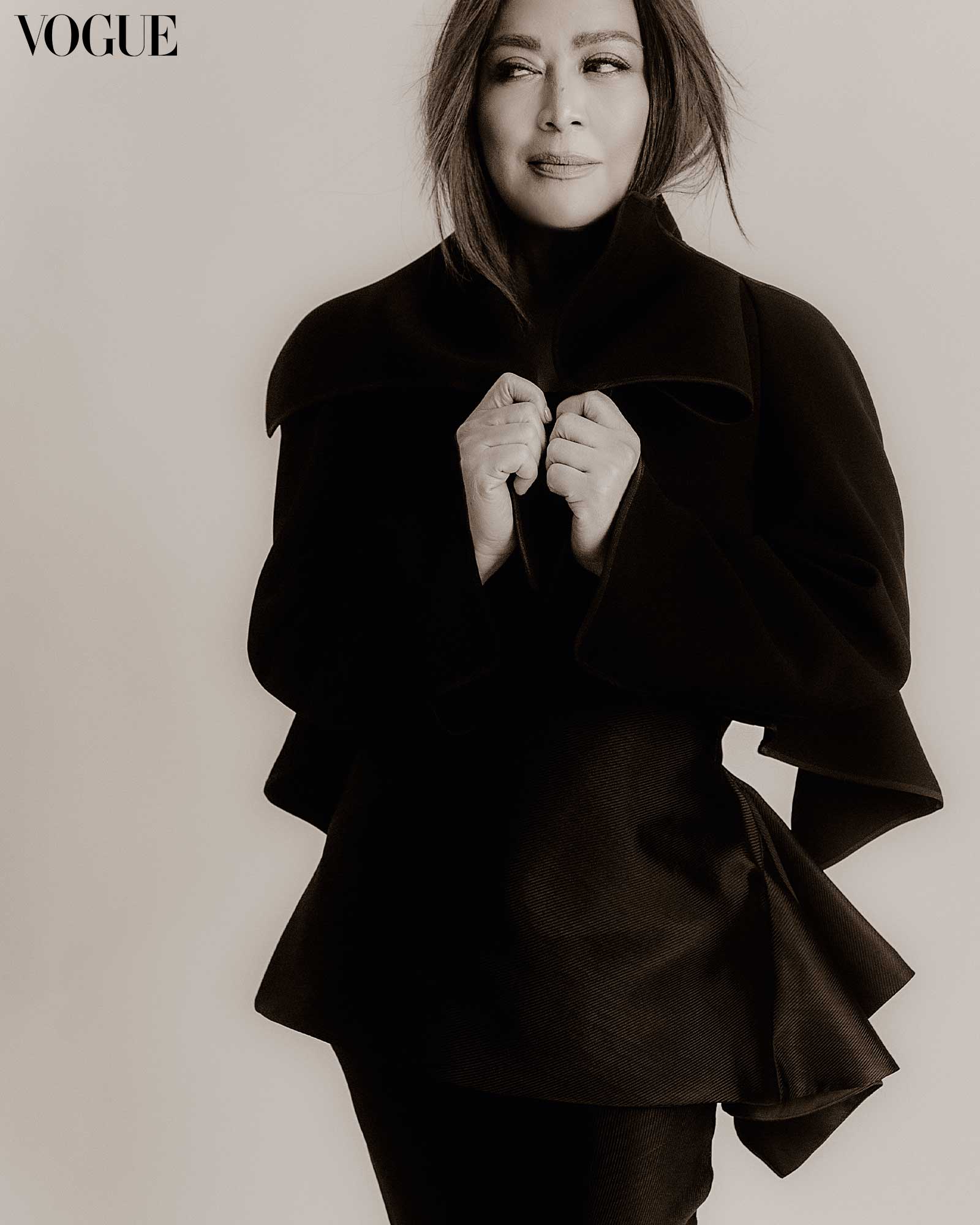
“I think we grow up following the role models we see growing up. Why am I this person today? It’s because of a woman, my mother.”
Karen talks about the women who were her role models in the industry.
“One of the reasons I became a broadcaster, was because when I turned on the TV, I saw women like Cheche Lazaro and Loren Legarda on the air, icons, people I looked up to,” she says.
She mentions women who helped her in her career, including former bosses Marissa Flores and Nessa Valdellon at GMA, and Luchi Cruz Valdes, Maria Ressa, and Ging Reyes at ABS-CBN.
“In the workplace, I see the importance in fostering community with women. We have to be women who open doors for other women, the way other women opened doors for me,” she says. “It’s so important to mentor another woman, to spot a woman you can develop, whom you can share your learnings with. As you move through life, support women who want to climb and succeed like you did.”
Karen hopes to pay it forward herself by becoming a role model for young women who want to make a difference in the industry, and in the world.
“I honestly think it’s great to be a woman, and it’s a great time to be a woman. There was a time when women couldn’t vote, when women didn’t have a right to their reproductive bodies, when women couldn’t run for public office,” she says.
“We are at a time when women have to pave the way forward for more women. We have to be able to advance what our predecessors have done for us. The only way to move forward is to champion other women, to go out there by just mentoring one woman, supporting one woman, being a role model for one woman. If you can do that for five, 10, 20, all the better. Choose to be the woman who is the role model in your sphere of influence.”
By YVETTE FERNANDEZ. Photographs by COLIN DANCEL. Fashion Director: PAM QUIÑONES. Makeup: Nizel Raduta. Hair: Mong Amado. Producer: Anz Hizon. Nails: Extraordinail. Production Assistant: Bianca Zaragoza. Photographer’s Assistant: Yel Dela Paz. Lighting Director: Joey Alvero. Stylist’s Assistant: Neil De Guzman, Jill Santos. Retouchers: Yel Dela Paz, Mersi Carballo.
- Karen Davila Has Been Appointed As The First UN Women Philippines Goodwill Ambassador In New York
- The United Nations Fashion And Lifestyle Network Is Moving Forward With A Renewed Vision
- UN Women Launches Country Priorities Toward Women’s Empowerment For 2024
- “No Action Is ‘Too Small’”: COP28 Youth Delegate Javea Estavillo On Climate Change In The Philippines
